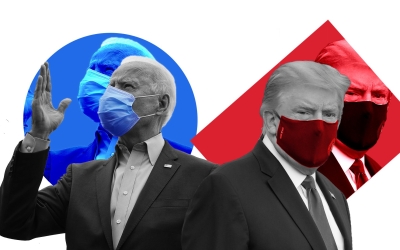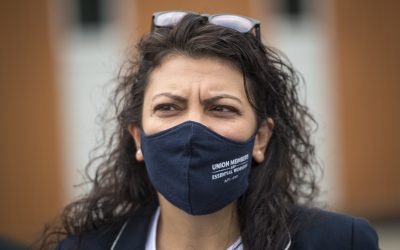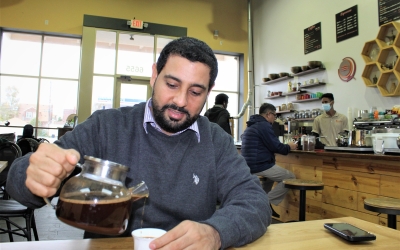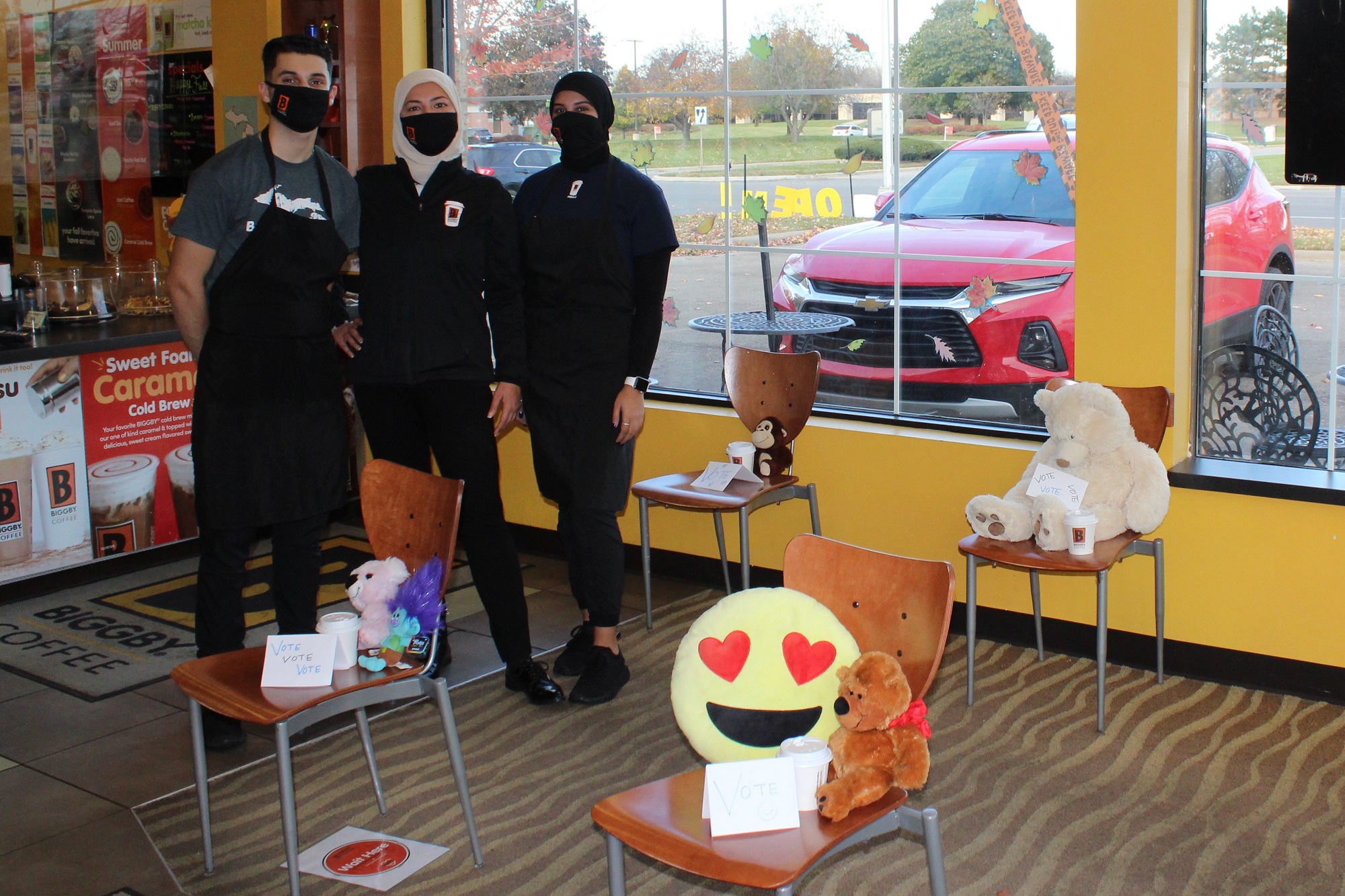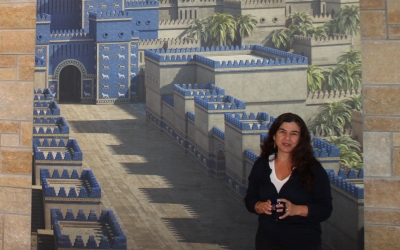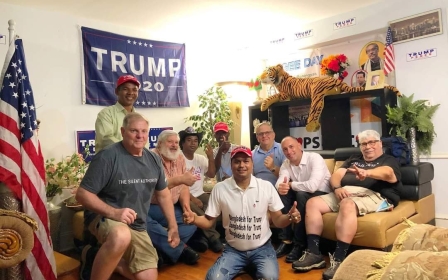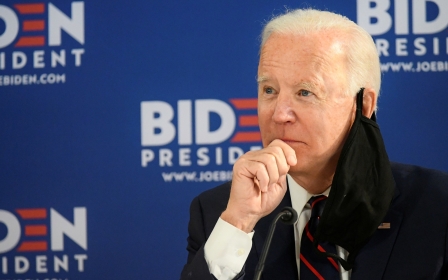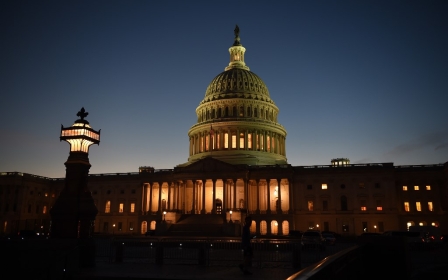US elections 2020: In the heart of Arab America, voters are anxious
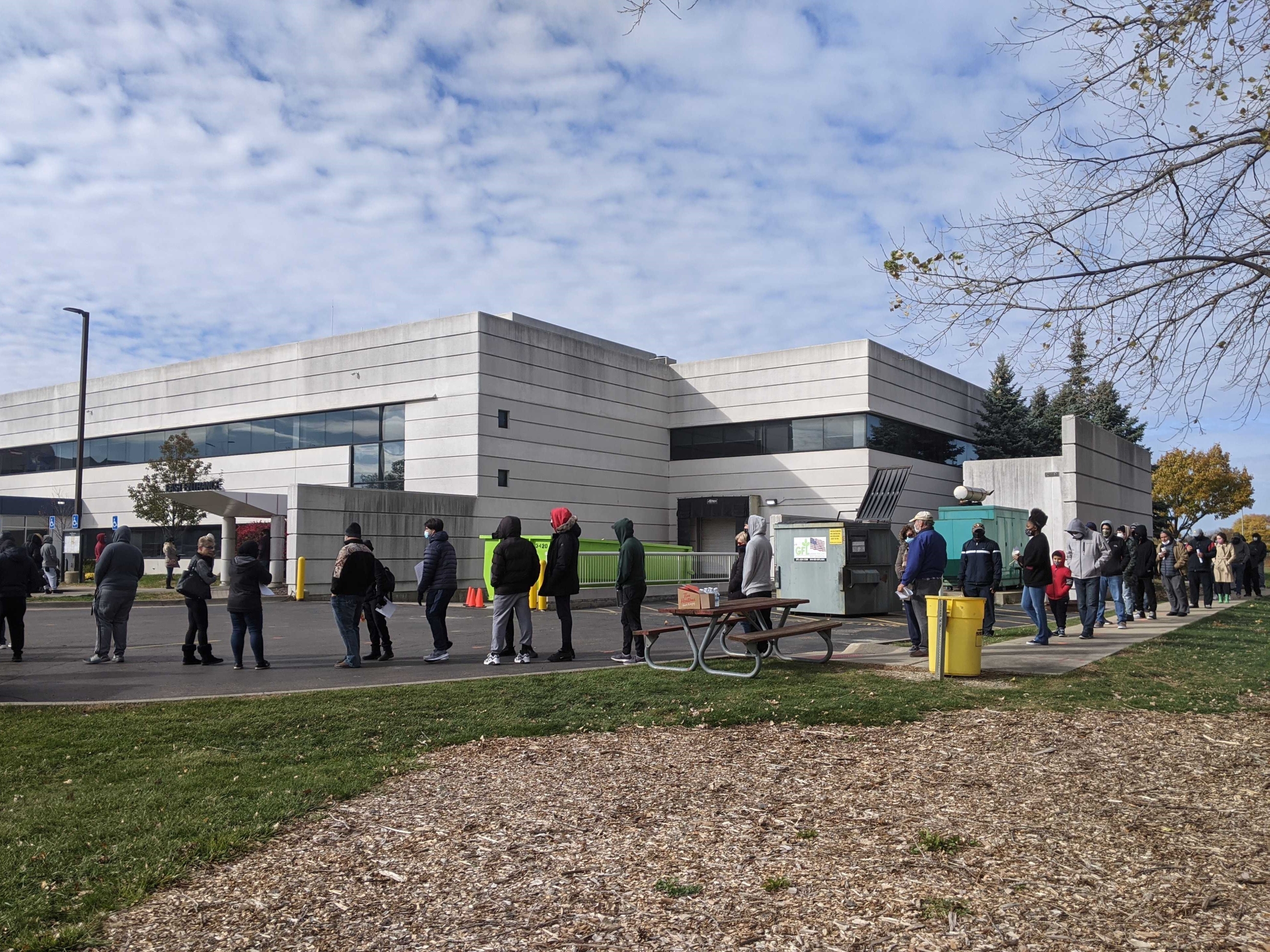
Nivine Eldayeh is worried. The 20-year-old from Dearborn, Michigan, fears that if Donald Trump wins, her Arab community will face further discrimination from the White House. If he loses, she fears that her hometown may become a target for his disgruntled supporters.
Standing in the cold to vote early at the city's municipal building on Monday, Eldayeh says despite the unease about the election, she feels excited to cast her ballot for the first time.
"You always have to vote," she told MEE. "We live in the United States; you have to vote to be represented. And if you don't agree with both candidates, just go with whatever you think is best."
Wearing a grey hoodie that covered her black hijab, Eldayeh said she will be voting for Democratic candidate Joe Biden because Arab- and Muslim-Americans have endured demonisation and hate under Trump.
"It's sad to live with fear from our own president."
In the lead up to the election, Trump has intensified his push to win Michigan, home to large Arab and Muslim communities, visiting the swing state four times in the past six days and holding big rallies despite the worsening Covid-19 outbreak.
In his appearances, Trump has perpetuated an anti-immigrant xenophobic message, repeatedly claiming that Michigan has a problem with refugees.
The pandemic
Beyond immigration, Arab Americans say they are worried about issues that affect all Americans - most pressingly, the coronavirus.
Mohammad Qazzaz, a 36-year-old who owns a coffee company in Dearborn, caught the virus late in March. For the past eight months, he's been suffering from its effects on his health and business.
"I'm nervous; I'm worried," Qazzaz told MEE. "I'm hoping that Biden wins, just so we can have some order in the country because all Trump is doing is disorder."
Standing at 6'4 in the Qazzaz Coffee shop, with a photo of the skyline of the Old City of Jerusalem over his head, the Palestinian-American business owner says Trump has failed to show any empathy for the victims of the pandemic.
"At this moment I think that we need a leader not only that would lead, but who is sympathetic," Qazzaz, readying coffee bags to be filled with his families signature Abu Dawood blend, told MEE.
"People are dying. People are getting infected. There's more than nine million people that got infected with this virus and that have issues from it."
He stressed that the 231,000 deaths from the pandemic don't tell the whole story. Survivors are still facing health challenges from the disease. Despite being coronavirus-free for a few months, Qazzaz - who had no pre-existing conditions - is suffering from heart issues.
He pulled his shirt down to show a device attached to his chest that monitors his heart rate for spikes.
'We don't know what's going to happen'
After recovering from Covid-19 himself, Trump urged Americans not to worry about the virus. On the campaign trail, the US president often cites his own experience with Covid-19 to play down its impact - remarks Qazzaz says demonstrate his inability to recognise others' pain.
The 36-year-old Palestinian American said he received a phone call from Biden in April. He said the former vice president's campaign contacted him randomly as it was reaching out to coronavirus victims. He was set for a brief call with Biden, but the conversation lasted some 22 minutes.
'This election will affect our Arab community and our children for years to come'
- Asad Alfatlawi, Iraqi-American voter
On the call, Qazzaz said, Biden comforted him about not being able to interact with his children while in quarantine - with the former vice president sharing his own experience when he lost his wife and daughter in a 1972 car accident and his son Beau to cancer in 2015.
Qazzaz said the call sealed his conviction that Biden was the candidate he should vote for.
Even with a Biden presidency, Qazzaz says he remains anxious "about the future of the country" if Trump rejects the election results and eggs on his supporters to cause chaos.
"I'm very worried. I have a Biden sign on my house and on my car. My mom was like: 'Hey, take them down. We don't know what's going to happen'," Qazzaz recalled.
"I said, well, the whole point of us moving here is for freedom of speech, freedom of expression, freedom of religion. This is what this country is all about. Why am I going to take them down? Because I'm scared of these Trump supporters?"
'We are all worried'
Dearborn, a Detroit suburb of 94,000 people, is known as the capital of Arab America for its large concentration of Arab residents who have filled the city with Middle Eastern restaurants, coffee shops, hair salons and other businesses, often displaying Arabic script on their storefronts.
Back at the city's municipal building, volunteers were handing out pizza and coffee to voters on Monday with gusts of freezing wind adding to the discomfort of the Midwestern late autumn weather.
"We are all worried about the future," Asad Alfatlawi, a 48-year-old Iraqi-American father of five told MEE while waiting in line.
"This election will affect our Arab community and our children for years to come."
He said Arab Americans are "fatigued" by Trump's presidency. "The state of the country is not good. The economy is bad. The disease is spreading, but we can't but hope for a better future."
Mohamed Qasim, 25, said the past four years have been a time of "no normalcy", especially for Arabs and Muslims.
In one of his first decrees as a president, Trump imposed in 2017 a travel ban on several Muslim-majority countries, an executive order that activists say not only hurt families trying to connect with their loved ones overseas, but also emboldened bigotry in the US.
Qasim said Trump made it more acceptable for people to hate. "We've had four years of chaos, of hate, of racism, of bigotry."
He added that the political mayhem has taken its toll on people mentally. "I can't wait until election day is over."
After a department store in Dearborn boarded up its store front last week, concern rose in the community about anticipation of civil strife, prompting Police Chief Ronald Haddad to assure residents that there are "no specific threats regarding Tuesday's election".
"Rest assured the Dearborn Police Department will continue to work with all local, state, regional and federal law enforcement agencies to monitor and respond to any possible threat," the police department said in a statement on Saturday.
Seeking help
Not only in Dearborn, stores across the country have been covering their glass facades with wooden boards - a phenomenon that became especially prominent in Washington, the nation's capital.
"I am feeling a little anxious about everything. I am on edge about what will happen both in terms of the results of the presidential election but also what could happen in the days after," Lebanese-American Washington-based activist Danny Hajjar told MEE.
'Everything feels emotionally draining right now'
- Danny Hajjar, Lebanese-American activist
"It feels ominous to see many places here in DC, and in many other cities across the country, boarded up and anticipating violence. I worry about the potential for that and what could happen. Everything feels emotionally draining right now."
Hajjar stressed the need for seeking self-help and reaching out to loved ones without casting judgement on others' mental state.
"It would be disingenuous of me to tell people, especially those of us in the Arab American community, to 'breathe' or to 'stay calm' because these anxieties and these emotions are real," he said.
"We need to acknowledge that and we need to respect that people have different ways of processing their emotions. What we can do is make sure that we are in a place where we feel at peace or feel like we have enough energy to go about the day, and then really check in on everyone you know from time to time."
'We withstood the last four years'
In Dearborn, ACCESS, a Dearborn-based community non-profit that provides behavioural health services, is also urging people to turn for help if they need it.
"As we collectively engage with this historical election in the midst of a worldwide pandemic, the practice of self-care and mental health and wellness is more critical than ever," ACCESS told MEE in a statement.
Killoud Dabaja, who operates a coffee shop in Dearborn, is trying to create a "happy space" for the community.
Chairs that once hosted patrons at the cafe before the pandemic are now occupied by socially-distanced teddy bears and pieces of paper that read: "Vote".
Dabaja will be handing out free coffee and tea to voters on election day. "I'm feeling very confident that as a business owner, we are going to be here for the community, and we're going to help support them, and we're gonna try to make this a very happy place."
While acknowledging the difficulties of the political climate, Dabaja told MEE that she is trying to "keep everything positive".
"We withstood the last four years; we will withstand the next hundred," she said. "We will withstand anything that comes our way - if it comes our way."
This article is available in French on Middle East Eye French edition.
Middle East Eye propose une couverture et une analyse indépendantes et incomparables du Moyen-Orient, de l’Afrique du Nord et d’autres régions du monde. Pour en savoir plus sur la reprise de ce contenu et les frais qui s’appliquent, veuillez remplir ce formulaire [en anglais]. Pour en savoir plus sur MEE, cliquez ici [en anglais].


